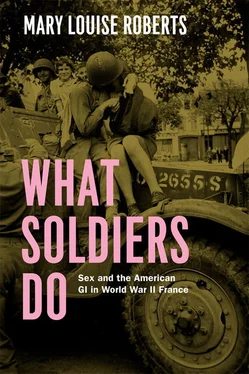The French were also wary of the Americans. Frank Irgang remembers that as the Normans walked past him, “they gave me a hurried glance of distrust which made me feel unwanted.” 144Bombing had left a sour taste in the Norman mouth. German propaganda had shaped views of the Americans and British more than anyone wanted to admit. 145By the end of June, Allied Headquarters, concerned enough to do a survey about Norman attitudes toward Americans, discovered a generally positive attitude despite some grumbling about looting. 146In general, military officers preferred to attribute whatever coolness they experienced to “the dour and undemonstrative nature of the Norman.” 147Civil Affairs officers were warned that the Norman “is by nature reserved, a fact which may prevent too open a manifestation of welcome.” 148If the Allies “expected to find caricatures of Southern Frenchmen eager to kiss them on both cheeks,” claimed one French pharmacist, they would be sadly disappointed. 149Normans also acknowledged that they had greeted their liberators with “no wild enthusiasm but instead a dignified satisfaction as well as smiles and the shaking of hands.” 150They, too, explained this response as an effect of the Norman character. When a French soldier traveling east with the British Army noticed that the village atmosphere had suddenly become more friendly, he was not surprised to discover that his unit had left Normandy. 151Despite the war’s anguish and liberation’s euphoria, noted Danièle Philippe, “most folks remained true to themselves. Les Normands, c’est du solide! [The Normans are tough stock!]” 152
In fact Norman aloofness can be understood in circumstantial terms. As we have seen, during the summer of 1944, the Allies were far from winning the war. Fearful of reprisal if their villages fell again to the Germans, Norman civilians had the sense not to talk to either side. 153Only after they witnessed the massive numbers of Allied troops, tanks, and guns being unloaded onto the beaches did they believe the Allies planned to stay. “Very soon they were opening up to us,” noted one military report, “not only their hearts, but all their possessions.” 154“The civilians began to realize that we were there for good,” remembered Edward Rogers. “French flags appeared, flowers, fruit and eggs were given to us as we passed villages and farms.” 155
Meanwhile, Norman stoicism was on stunning display. A young couple, Juliette and Georges, planned to marry at Sainte-Mère-Église on the sixth of June. Despite the landings, they pressed on with the ceremony, and were attended by an American captain and two lieutenants. 156The journalist Alan Moorehead found a Norman railway ticket master at his post in a railway station, ruins all around him. “There have been no trains here since Tuesday,” he conceded. 157Still another Norman peasant complained to the Allies that for several nights he had trouble sleeping because of a bomb that had landed on his bed. Could they come by sometime soon and deactivate it? 158Locals doggedly milked their cows and churned their butter, even if it meant walking across battlefields. 159One peasant was quite intent on planting his green beans despite bombs falling nearby. 160Lt. Col. Francis Sampson noted one farm woman who didn’t miss a stroke milking one of her herd, all while the bombs fell around her. 161Still another Normande , when warned of the war in her backyard, turned to her daughter and urged her to milk anyways. “It will be a little bit earlier than usual,” she conceded, “but when we are finished, these American gentlemen will have cleaned out the corner.” 162In fact, the Normans paid a price for such forbearance: a woman and her son were killed when she refused to stop doing her cleaning at the public laundry, even while guns fired all around them. 163So close to the battle did the Normans come that the GIs sometimes suspected them to be German spies. 164
If the GIs admired the Norman countryside, they fell in love with the “wonderfully clean and beautiful little” children. 165“Don’t believe I ever saw children any handsomer than the French children are,” wrote Giles in his journal. “I’ve not seen a real ugly one yet.” 166The well-known journalist Ernie Pyle described the region as “certainly a land of children. …And I’ll have to break down and admit that they were the most beautiful children I have ever seen.” In fact, Pyle was more impressed by the children than the adults. “Apparently they grow out of this,” he speculated, “for on the whole, the adults looked like people anywhere—both good and bad.” 167When he arrived at Le Havre, Joseph Edinger came to the same conclusion in his diary: “Coming out we all noticed the French people themselves. Most of them are short and somewhat stocky. They aren’t very good looking, the women, but the children are beautiful. They must change at or in their adolescence.” 168
Predictably the very first Normans to open their hearts to the GIs were these children. Fifteen-year-old Bernard Gourbin remembers the wink he got from a GI fighting outside his window. 169Parents cringed at their children’s lack of reticence with soldiers. 170Nevertheless the GI lap became a valuable piece of real estate for the smallest Normans. It did not hurt that the soldiers had big pockets bursting with candy and chewing gum, pockets that Gilles Bré noticed right away on D-day, even while the scary Americans were furiously searching his house. 171Children appeared with large eyes and empty spoons at the windows of makeshift mess halls. 172They could depend on the GIs to take more than they needed for dinner, then share food. 173With hearts aching for their own families, the Americans did everything they could to protect children from harm. As Norbert Koopman’s unit was passing through Saint-Lô, they came upon about two dozen children under the care of nuns. “The children were frightened by what was happening,” remembered Koopman. “They didn’t know if we were friend or foe. We stopped and comforted them. It was sad to see these children so upset.” 174
Norman children remember the American soldiers during the summer of 1944 as “demi-gods haloed with a kind of supernatural prestige,” who showered them with love and attention. With the GIs, remembered Charles Lemeland, twelve years old in 1944, “it was the wonderful world of laughter, play, and permissiveness: candy galore, the thrill of getting inside tanks and other fascinating machinery and touching all those levers and pedals.” 175Norman children also learned skills from the GIs, like how to play gin rummy and make scoubidous. 176A fatherless child of six crippled by polio, Francine Leblond lovingly remembers an American parachutist whom her parents hid from the Germans. Calling her “Francisca” after his hometown of San Francisco, the GI would take her in his arms, carry her around the yard, and show her American planes through his binoculars. “When he left, I was inconsolable,” remembered Leblond. 177Christine Delpierre also remembered crying like “a girl abandoned by everyone” when the GIs left, despite all efforts by her father to cheer her up. 178For Norman children as well as adolescents and young men, the war was a great adventure, the most exciting thing that had ever happened to anyone ever.
The parents and adults also had vivid memories of the Americans. They were dirty and dusty; they looked tired; their teeth were quite white. 179“Big children, somewhat primitive but very nice,” was how Françoise de Hauteclocque described the GIs. 180And they were big—“tall as a building,” “giants,” “huge devils,” and “solid as bombs.” 181Also, they looked like cowboys, with their colts slung on their hips. 182Most surprisingly, they did not look at all like each other. The bewildered Comtesse de Tocqueville remarked in a letter to her husband that “Americans of all coats and colors” had invaded her chateau. 183“What a mix of races!” exclaimed de Hauteclocque. “It is common to meet a soldier whose father is Greek and mother German. And yet they all come together under the star-spangled banner.” 184Danièle Philippe was astonished to realize that the first two Americans he met were Italian and Scandinavian. What then was “American”? 185Finally, there were the boots. “Their yellow shoes are superb!” enthused Madame Destors in her diary. 186Long-deprived of leather by the Germans, Normans could not take their eyes off American boots, with their soft uppers and heavenly rubber soles. Unlike the clicking of German boots, they were deliciously silent when the GIs marched through town. 187Jacques Petit was ecstatic when he found an abandoned pair of American boots at an old camp. “They fit me like a glove!” he gushed in his diary. As for those “old clodhoppers with wooden soles,” they soon found their way to the back of his closet. 188
Читать дальше












